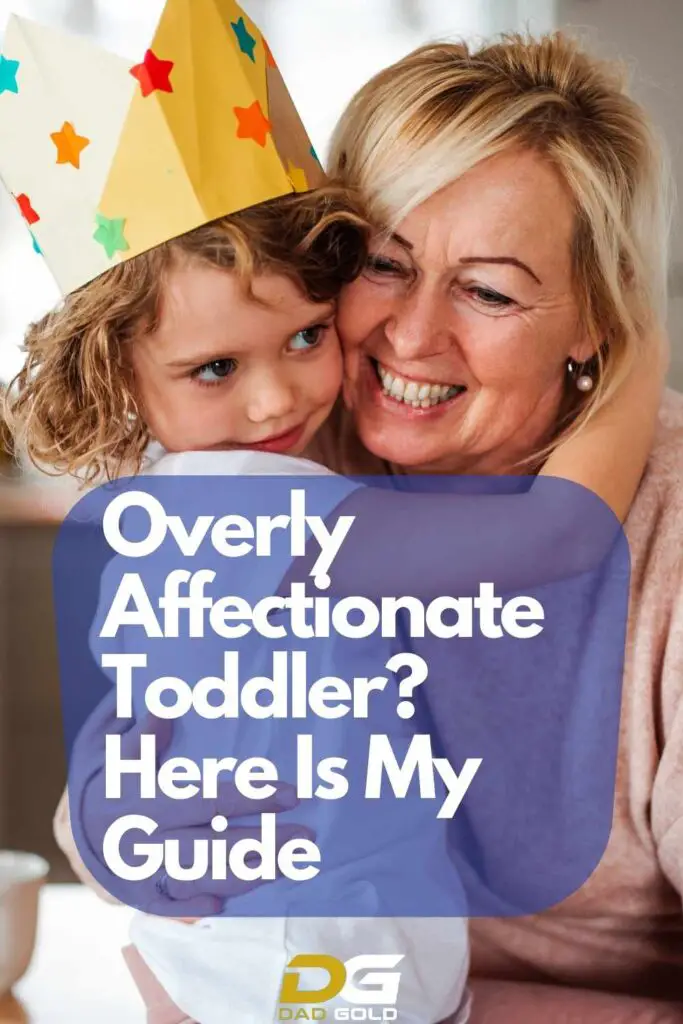Toddlers explore the world with fresh eyes, embracing everything with curiosity and love instead of fear and hate.
They are still learning how to regulate their emotions, so often, toddlers rely on their actions to do the talking for them.
Kisses and hugs are appropriate signs of affection for your toddler, but they may not understand how to limit them, causing them to become overly affectionate.
This is where boundaries come in.
As you teach your toddler boundaries, they begin to understand how to express their emotions in moderation and adequately.
Let’s explore how you can work with your overly affectionate toddler to become more independent.

What Exactly is an Overly Affectionate Toddler?

An overly affectionate child is clingy and displays over-the-top expressions of emotion. This could be big sloppy, lingering kisses or giant hugs that last too long.
They may want to cuddle excessively or request to only sleep with their parents. The overly affectionate toddler needs constant reassurance through touch and physical contact.
-

Bold Male Pride – Baseball Trucker Cap Celebrating Masculinity
£18.00 Select options This product has multiple variants. The options may be chosen on the product page -

Dad Bod Appreciation Gift Mug
£14.00 Add to cart -

Dad Bod, Bad Jokes Structured Baseball Cap
£22.00 Select options This product has multiple variants. The options may be chosen on the product page
Often, these behaviors are not limited to parents and other family members. They will act the same way to friends and strangers alike. Stranger danger doesn’t exist to the overly affectionate toddler, so they will sit on their laps, hug, kiss, and talk to strangers without reserve.
Now, keep in mind that overly affectionate is a relative term. What feels appropriate to you may be different for someone else.
But if your child lacks boundaries with their affections, they may be overly affectionate.
Why is my Toddler Overly Affectionate?

Toddlers learn so much by watching their parents and the world around them. If your child is overly affectionate, they may be mimicking behaviors they see by watching you.
This can extend to the entire family if you have not set boundaries for appropriate behaviors.
Toddlers cannot yet distinguish between familial bonds and those of the external world, so they may not understand that kissing and hugging should only be reserved for those you love.
Toddlers who caregivers neglect may also be overly affectionate because they seek the comfort of the human touch.
It does not matter to them where they get it, so they may start to act out. Your toddler may also remove all affection to teach you a lesson as an act of defiance.
5 Tips for Addressing Overly Affectionate Toddlers

You can take steps to moderate your overly affectionate toddler’s behaviors and help them set appropriate emotional and physical boundaries.
Teach your Toddler Boundaries
Social cues can be tricky to master.
What is comfortable for one may be crossing a line for another, so it is essential to teach your toddler boundaries. For example, if someone extends their hand, they are looking for a handshake. If someone opens their arms, they would like a hug.
These universal social cues can help set appropriate boundaries for your overly affectionate toddler.
It is never appropriate to hug and kiss strangers.
Teach your child that they should not be kissing others on the mouth unless that is acceptable for family members only. Instead, they can give cheek kisses or replace them with a hug in greeting.
Be consistent in the boundaries that you are setting with your children. Until they understand nuances, everything is black and white to them.
Ask Permission
One of the best ways to respect another’s boundaries is by asking permission. You can teach your toddler that it is appropriate to ask before they hug or kiss someone.
Once they get permission, they can show affection.
If they do not, they should respect the other person’s boundaries. It is not that they don’t like you. It’s just that everyone has different levels of comfort with affection and personal space.
Set Limits

If your child is overly affectionate, they may need limits to how many times they can be hugged or kissed. For example, you can say that hugs are only for good morning, goodnight, and to reward positive behaviors throughout the day.
You might want to try a five-hug-a-day rule. It is up to you if you implement limits of hugs and kisses, as it is your toddler.
How you want to establish these limits is up to you, but they are essential. Along with boundaries, limits can help your child start to self-soothe rather than rely on others’ touch to comfort.
Don’t Get Mad
Your child’s behaviors are not going to change overnight. They have decided they need to be overly affectionate, and these behaviors and needs will take time to address.
If your child starts to disregard personal boundaries and personal space, don’t get mad or yell at them. This may cause them to become clingier.
Instead, calmly talk to them and reinforce the importance of boundaries. Act out different scenarios to make them feel comfortable and make it fun for them!
Your child needs time to readjust their behaviors, so be patient.
If All Else Fails, Seek Help

If you are still worried about your overly affectionate toddler, many child therapists can help you with the process of making your child more independent.
They can help uncover any issues your child may not want to talk to you about, in addition to helping to teach boundaries, limits, and more.
Therapy may not be for every overly affectionate child, as most will grow out of these behaviors, but you can seek outside counsel if you think you need help.
Final Word on Overly Affectionate Toddlers
With proper attention to boundaries and limits, your toddler can overcome the overly affectionate stage. However, as they navigate self-regulating their emotions, it is vital to reinforce the importance of stranger danger.
While you don’t want to teach your toddler to fear strangers, being overly affectionate with them can threaten their safety.
Your children need to know their boundaries, including where and how it is appropriate to be touched and whom they should talk to if they become uncomfortable.
Your toddler is building the foundation for their emotional well-being for years to come, so it is crucial that we set our children up for success from an early age.
Plus, as parents, it is challenging to limit love and affection, as that could have another impact. Having an affectionate parent is crucial for a child’s well-being.
Good luck!




